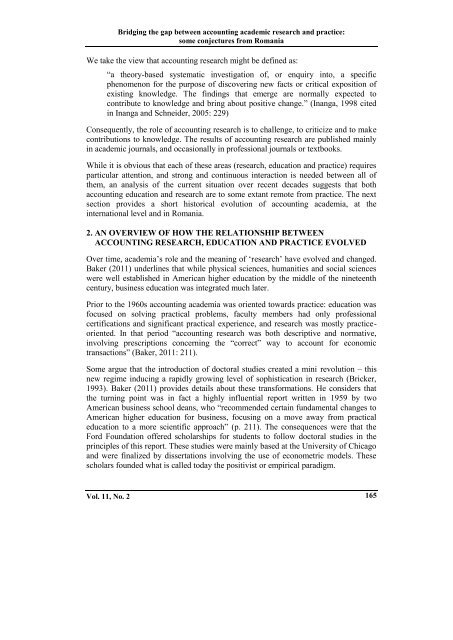bridging the gap between accounting academic research and practice
bridging the gap between accounting academic research and practice
bridging the gap between accounting academic research and practice
You also want an ePaper? Increase the reach of your titles
YUMPU automatically turns print PDFs into web optimized ePapers that Google loves.
Bridging <strong>the</strong> <strong>gap</strong> <strong>between</strong> <strong>accounting</strong> <strong>academic</strong> <strong>research</strong> <strong>and</strong> <strong>practice</strong>:some conjectures from RomaniaWe take <strong>the</strong> view that <strong>accounting</strong> <strong>research</strong> might be defined as:“a <strong>the</strong>ory-based systematic investigation of, or enquiry into, a specificphenomenon for <strong>the</strong> purpose of discovering new facts or critical exposition ofexisting knowledge. The findings that emerge are normally expected tocontribute to knowledge <strong>and</strong> bring about positive change.” (Inanga, 1998 citedin Inanga <strong>and</strong> Schneider, 2005: 229)Consequently, <strong>the</strong> role of <strong>accounting</strong> <strong>research</strong> is to challenge, to criticize <strong>and</strong> to makecontributions to knowledge. The results of <strong>accounting</strong> <strong>research</strong> are published mainlyin <strong>academic</strong> journals, <strong>and</strong> occasionally in professional journals or textbooks.While it is obvious that each of <strong>the</strong>se areas (<strong>research</strong>, education <strong>and</strong> <strong>practice</strong>) requiresparticular attention, <strong>and</strong> strong <strong>and</strong> continuous interaction is needed <strong>between</strong> all of<strong>the</strong>m, an analysis of <strong>the</strong> current situation over recent decades suggests that both<strong>accounting</strong> education <strong>and</strong> <strong>research</strong> are to some extant remote from <strong>practice</strong>. The nextsection provides a short historical evolution of <strong>accounting</strong> academia, at <strong>the</strong>international level <strong>and</strong> in Romania.2. AN OVERVIEW OF HOW THE RELATIONSHIP BETWEENACCOUNTING RESEARCH, EDUCATION AND PRACTICE EVOLVEDOver time, academia’s role <strong>and</strong> <strong>the</strong> meaning of ‘<strong>research</strong>’ have evolved <strong>and</strong> changed.Baker (2011) underlines that while physical sciences, humanities <strong>and</strong> social scienceswere well established in American higher education by <strong>the</strong> middle of <strong>the</strong> nineteenthcentury, business education was integrated much later.Prior to <strong>the</strong> 1960s <strong>accounting</strong> academia was oriented towards <strong>practice</strong>: education wasfocused on solving practical problems, faculty members had only professionalcertifications <strong>and</strong> significant practical experience, <strong>and</strong> <strong>research</strong> was mostly <strong>practice</strong>oriented.In that period “<strong>accounting</strong> <strong>research</strong> was both descriptive <strong>and</strong> normative,involving prescriptions concerning <strong>the</strong> “correct” way to account for economictransactions” (Baker, 2011: 211).Some argue that <strong>the</strong> introduction of doctoral studies created a mini revolution – thisnew regime inducing a rapidly growing level of sophistication in <strong>research</strong> (Bricker,1993). Baker (2011) provides details about <strong>the</strong>se transformations. He considers that<strong>the</strong> turning point was in fact a highly influential report written in 1959 by twoAmerican business school deans, who “recommended certain fundamental changes toAmerican higher education for business, focusing on a move away from practicaleducation to a more scientific approach” (p. 211). The consequences were that <strong>the</strong>Ford Foundation offered scholarships for students to follow doctoral studies in <strong>the</strong>principles of this report. These studies were mainly based at <strong>the</strong> University of Chicago<strong>and</strong> were finalized by dissertations involving <strong>the</strong> use of econometric models. Thesescholars founded what is called today <strong>the</strong> positivist or empirical paradigm.Vol. 11, No. 2 165
















